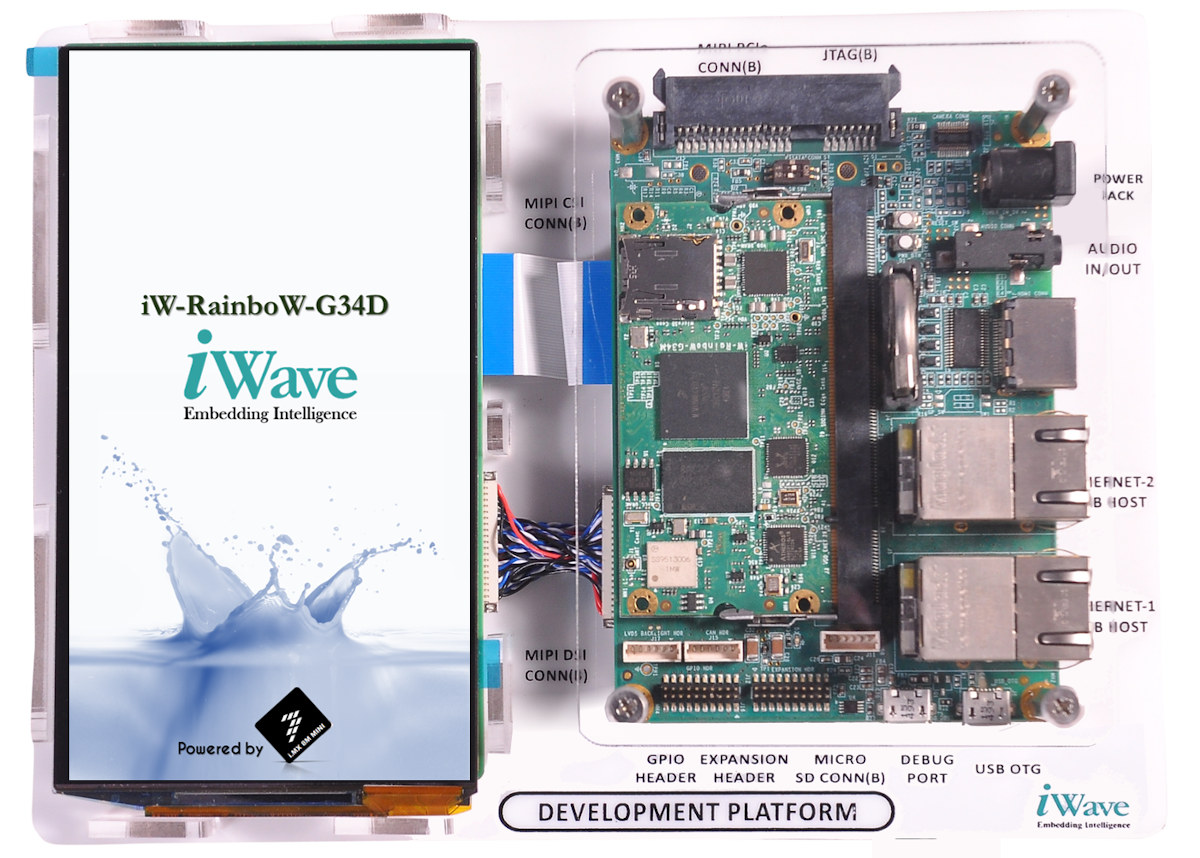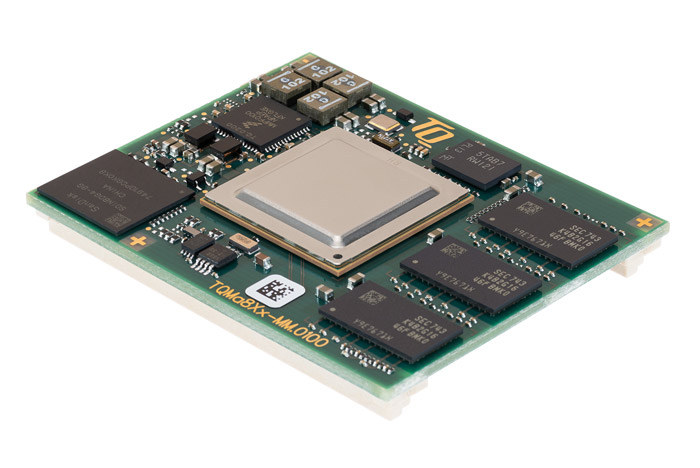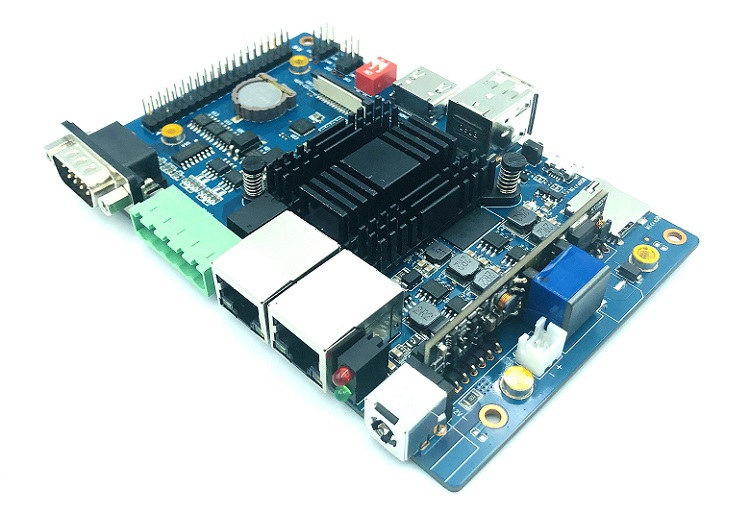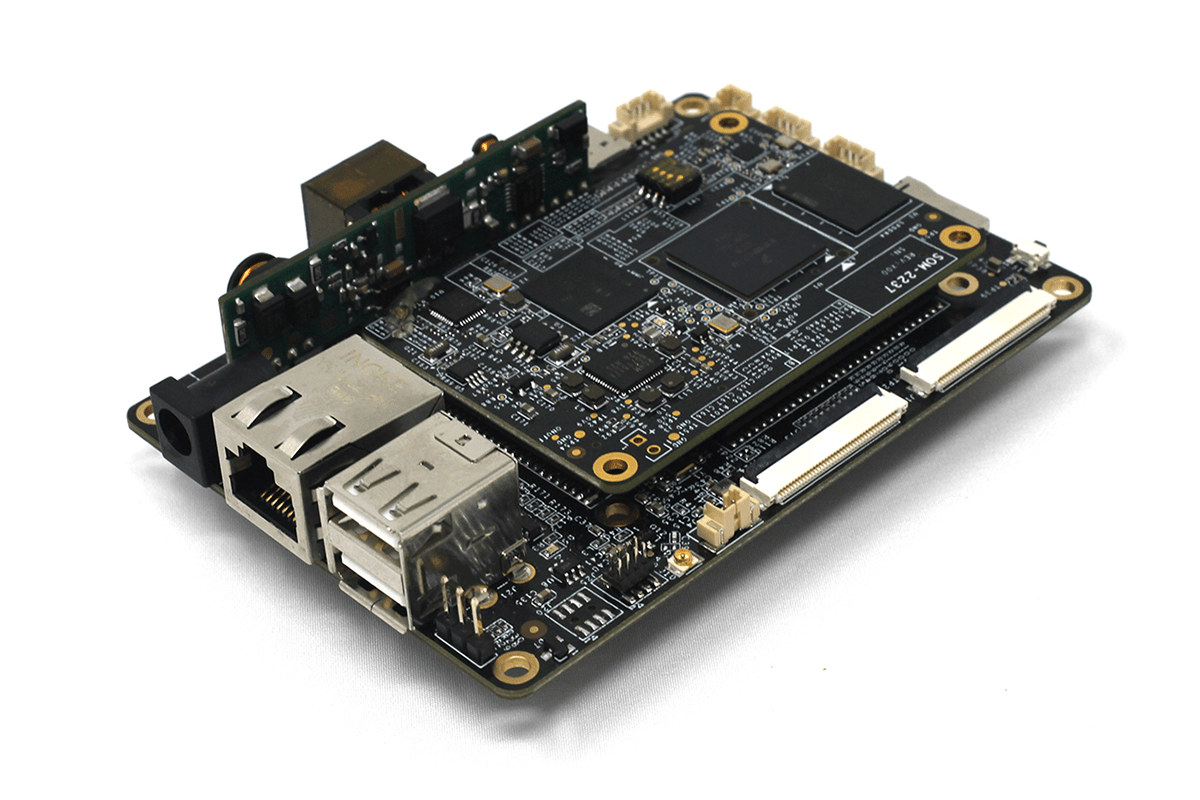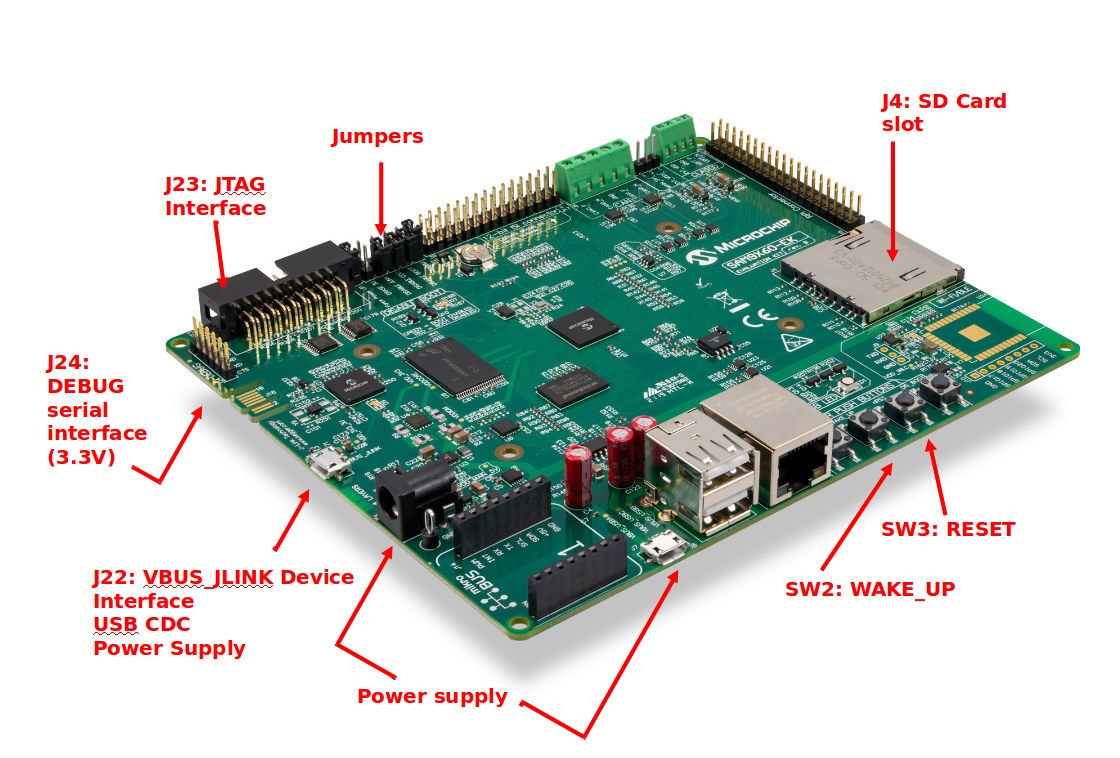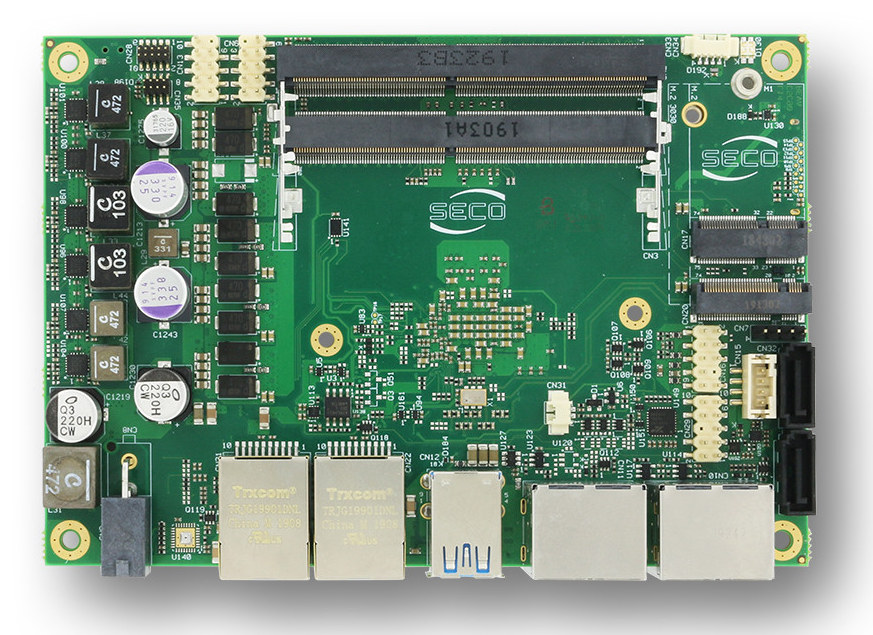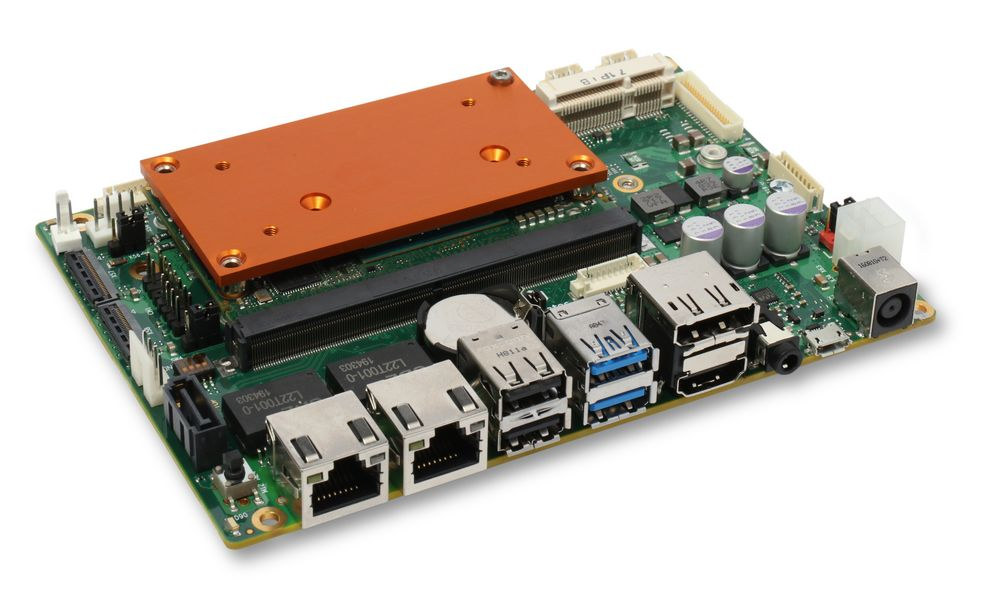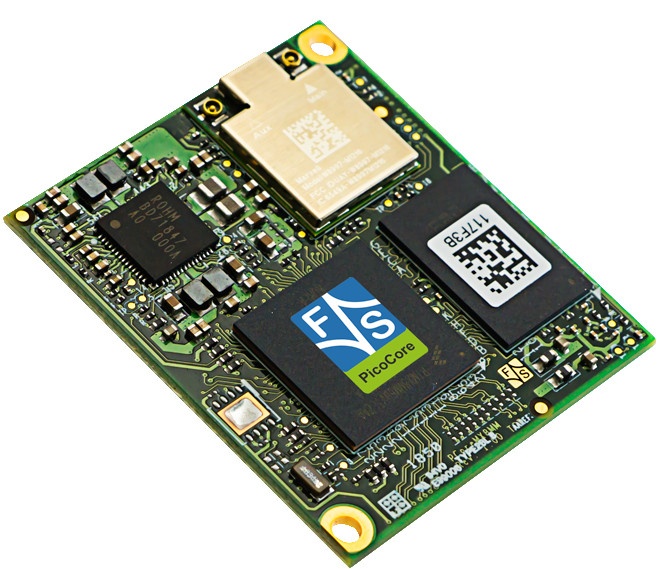iWave Systems i.MX8M Mini Board is a development platform based on an update versions of the company’s iW-RainboW-G34M-SM i.MX 8M Mini system-on-module and designed specifically for low-cost facial recognition systems thanks to NXP eIQ ML software, and MIPI display and camera. iWave Systems i.MX8M Mini (aka iW-RainboW-G34D) specifications: SoM SoC – NXP i.MX8M Mini Q/QL/D/DL/S/SL with up to 4x Cortex-A53 cores, 1x Cortex-M4F real-time core, Vivante 3D and 2D GPUs System Memory – 1GB LPDDR4 (Expandable up to 4GB) Storage – 8GB eMMC Flash (Expandable), optional 2MB QSPI Flash optional Micro SD slot Wireless – Dual-band 802.11a/b/g/n/ac WiFi 5 and Bluetooth 5.0. PMIC – BD71847AMWV i.MX8M SODIMM Carrier Board Storage – MicroSD slot Display I/F – MIPI DSI display connector Camera I/F – MIPI CSI camera connector Audio – Audio codec, 3.5mm Line In/Out jack Networking – Up to 2x Gigabit Ethernet ports (One is Optional) USB – 2x USB […]
TQ Group Announces NXP i.MX 8X ARM Cortex-A35 Modules as the Processor Finally Becomes Available
TQ Group, headquartered in Germany, has launched two NXP i.MX 8X Cortex-A35 modules with TQMa8Xx and TQMa8XxS SoMs, with the latter being SMARC 2.1 compliant, and both targeting various applications ranging from medical devices, HMIs, industrial controllers and industrial Internet of Things (IIoT) to gateways, building automation, transport, and robotics. The press release explains NXP will officially launch i.MX 8X CPUs on May 14, 2020. We first heard about i.MX 8X in 2016, before an official announcement in 2017, and we wrote about Toradex i.MX 8X SoM in 2018, plus 96Boards AI-ML SBC in 2019, so I naively believed the processor had been around for a couple of years, but the Toradex SoM product is still shown as an “early product announcement” [Update: the page has just been updated since it is now shipping as well], and AI-ML board has just launched with 26 units available on Arrow website. Some […]
Banana Pi BPI-F2P Industrial Control Board Adds PoE, RS-232 and RS-485 Interfaces
At the end of Last year, we covered Banana Pi BPI-F2S Industrial SBC powered by Sunplus SP7021 “Plus1” SoC with four Cortex-A7 core, an Arm A926 microprocessor, an 8051 core, as well as 128MB to 512MB built-in DDR3 RAM. The company has now unveiled Banana Pi BPI-F2P with the same processor and many of the same features, but with the addition of PoE support on one of the Fast Ethernet ports, as well as an RS-232 DB9 connector, and RS-485 terminal blocks. The expansion connector for an FPGA board found in BPI-F2S is however gone. Banana Pi BPI-F2P specifications: SoC – Sunplus SP7021 “Plus1” with a quad-core Cortex-A7 processor @ 1.0 GHz, one Arm A926 microprocessor, an 8051 core to handle I/Os, and 128MB or 512MB DDR3 DRAM. Storage – 8GB eMMC flash, microSD card slot Video Output – HDMI 1.4 output Camera I/F – MIPI CSI connector Connectivity – […]
NXP i.MX 8M Mini Pico-ITX SBC Comes with Audio DSP, Optional PoE and Google Coral M.2 Module
We’ve covered several NXP i.MX 8M Mini SBC‘s since the announcement of the processor in 2018 as the first i.MX SoC manufactured with a 14nm process allowing for a higher CPU clock of 2.0 GHz compared to the 1.5 GHz frequency used with the original i.MX 8M processor. i.MX 8M Mini also removes some features (4K video playback, some video interfaces, …) in order to lower the cost of the processor. Companies are still releasing new i.MX 8M SBCs regularly, but we don’t always cover them all since many often do not offer much compared to the competition. But Estone Technology EMB-2237-AI Pico-ITX SBC has some unusual features and options including a Cirrus Logic audio DSP, as well as support for a PoE module and Google Coral M.2 AI accelerator module. EMB-2237-AI SBC is comprised of a system-on-module and baseboard with the following specifications: Estone SOM-2237 module SoC – […]
ARM9 in 2020 – Meet Microchip SAM9X60 SoC & Evaluation Kit
In my first job, I wrote code for a MIPS processor for VoIP phones, then I switched to NEC/Renesas MCUs for CD and DVD players, before going back to Linux and my first experience with an Arm processor: Cirrus Logic EP9307 with a single ARM9 (ARM920T) core clocked at 200 MHz. That was in 2005, and according to Wikipedia various ARM9 cores were released between 1998 to 2006, and now such cores are not recommended for new IC designs with most companies now building their chips around Arm Cortex-A/M/R cores. At the end of last year, we wrote about Banana Pi BPI-F2S SBC based on Sunplus SP7021 “Plus1” quad-core Cortex-A7 processor with ARM9 and 8051 co-processor. Odd enough but at least the ARM9 core is not the main processor, however, while looking at the upcoming Linux 5.6 Linux kernel log I read an entry about a new SAM9X60 ARM926-based SoC […]
SECO Unveils 3.5″ Ryzen Embedded SBC, Docker-Compatible EDGEHOG OS Linux Distribution
After IBase IB918, here’s another 3.5″ Ryzen Embedded SBC courtesy of SECO SBC-C90 equipped with a choice of Ryzen Embedded V1000 or R1000-series processor, dual Gigabit Ethernet, and four DisplayPort++ ports. Separately from the hardware announcement, SECO has launched a Yocto-based, Docker-compatible Linux distribution called EDGEHOG OS and supporting containers, OTA updates, and remote management. SECO SBC-C90 SBC Specifications: SoC (one or the other) AMD Ryzen Embedded V1000 family: Ryzen Embedded V1807B quad-core/octa-thread @ 3.35GHz (3.8 Boost) with AMD Radeon Vega 11 Graphics; TDP 35-54W Ryzen Embedded V1756B quad-core/octa-thread @ 3.25GHz (3.6 Boost) with AMD Radeon Vega 8 Graphics; TDP 35-54W Ryzen Embedded V1605B quad-core/octa-thread @ 2.0GHz (3.6 Boost) with AMD Radeon Vega 8 Graphics; TDP 12-25W Ryzen Embedded V1202B dual-core/quad-thread @ 2.3GHz (3.2 Boost) with AMD Radeon Vega 3 graphics; TDP 12-25W AMD Ryzen Embedded R1000 family: Ryzen Embedded R1606G dual-core/dual-thread @ 2.6GHz (3.5 Boost) with AMD Radeon Vega […]
Congatec conga-SMC1 3.5″ Carrier Board is Designed for NXP i.MX8 SMARC Modules
Last year, Congatec introduced SMARC 2.0 compliant systems-on-modules based on NXP i.MX 8, i.MX 8M Mini and i.MX 8M Nano processors, together with Conga-SEVAL carrier board designed for evaluation and early software development, but is not suitable for deployment in the field. The company has now unveiled a standard 3.5″ carrier board – conga-SMC1 – that takes any of the company’s i.MX8 SMAC modules, in order to help their customers bring products faster to market thanks to a commercial-off-the-shelf (COTS) board. Congatec conga-SMC1/SMARC-ARM carrier board features and specifications: Supported SoM – conga-SMX8 (i.MX8), conga-SMX8-Mini (i.MX 8M Mini), or conga-SMX8-Nano (i.MX 8M Nano). Future SMARC 2.0 Arm-based modules should also be supported Storage – 1x SATA III (support of SATADOM VCC PIN 7 and PIN 8), 1x SATA power (+5V, +12V), MicroSD card socket, M.2 NVMe SSD support Display Interface 1x LVDS 18/24bit single/dual channel LVDS 2x optional eDP/DSI (dependent on […]
PicoCore MX8MN is a Tiny NXP i.MX 8M Nano Computer-on-Module
The PicoCore MX8MN Nano carries the NXP i.MX 8M Nano F&S Elektronik Systeme has announced the development of the smallest i.MX 8M based CoM yet: the PicoCore MX8MN Nano. Previously we had reported on the Congatec Conga-SMX8 Nano which was a fairly small CoM compliant with SMARC 2.0 standard. The PicoCore MX8MN is based on the NXP i.MX 8M Nano CPU with 1 to 4 Arm Cortex-A53 cores and a Cortex-M7 real-time core. The Nano is set to carry up to 8GB RAM and 32 GB eMMC, with optional WiFI/BT and support for -40º C to 85º C temperature ranges. Similar to Predecessor The PicoCore MX8MN Nano is very similar in structure to the PicoCore MX8MM Mini CoM, but with a different i.MX 8M Mini processor featuring the same Arm Cortex-A53 cores, but the Cortex M4 real-time core is changed to a more powerful Cortex-M7 core in the MX8MN Nano. […]


